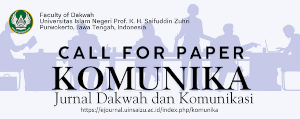BERBAGAI MASALAH KEBERAGAMAAN MASYARAKAT MODERN DALAM PERSPEKTIF DEKONSTRUKSI DAKWAH BERBASIS PSIKOLOGI SOSIAL
DOI:
https://doi.org/10.24090/komunika.v9i1.827Keywords:
Keberagamaan, Modern, Dakwah, Psikologi SosialAbstract
In one hand, modernity has fastened the development of science and technology, but on the other hand, it also alienates humans from their own spirit, caused by their exaltation on their industrial products. The effects of such condition occur in the following social and psycho logical symptoms: dislocation, disorientation and relative deprivation in certain social groups. In this context, da’wa has to deal not only with halal haram, but also with religious aspects of society and makes them a guideline to be adjusted to religious teachings. Da’wa needs to concern more on the aspect of mass psychology, with the emphasis on the principle of laa Rayba fiih in applying Islam, pathological treatment, and prevention of social deviation, as a result of modernity and laissez faire indi vidualism. The call for implementing the principles of bil hikmah, mauidah hasanah and mujadalah bi ahsan represents da’wa in its transmission, transformation, and socialization stages. Transmission deals with physical ap proach, transformation with social approach, and socialization with psy chological approach. They all present the historical facts, social-nuanced fiqh, grounded law, as well as prophetic mysticism. Modernitas di satu sisi telah melahirkan perkembangan ilmu pengetahuan dan teknologi yang sangat pesat, namun di sisi lain juga menciptakan keterasingan manusia dari jiwanya sendiri (alienasi) terjadi karena manusia telah mempertuhankan hasil-hasil industri yang dihasilkan oleh tangan mereka sendiri. Kemajuan pembangunan dan perubahan  perubahan sosial yang diakibatkannya telah menimbulkan gejala-gejala sosial-psikologis; dislokasi, disorientasi dan deprivasi relatif pada kelompok-kelompok sosial tertentu. Dalam konteks ini, dakwah dituntut tidak hanya berbicara tentang halal haram, tapi harus lebih menitikberatkan pada aspek keberagamaan masyarakat sebagai gejala psikologis yang layakdijadikan kerangka acuan, guna disesuaikan dengan “tuntunan†keberagamaan yang hanif/lurus. Dakwah perlu lebih concern pada lahan garap psikologi massa, penekanan laa rayba fiih dalam ber-Islam, penanganan patologis, dan penanggulangan deviasi sosial, sebagai akibat modernitas dan laissez faire individualism. Perintah dakwah bil hikmah, mauidah hasanah dan mujadalah bi ahsan merupakan corak dakwah dalam proses pentahapan transmisi, transformasi dan sosialisasi. Transmisi merupakan pendekatan d}ahiriyyah-kejasmanian; transformasi adalah pendekatan sosio logis berfenomena massa, dan sosialisasi adalah pendekatan psikologis. Itu semua menampilkan fakta-fakta sejarah, fakta fiqh bernuansa sosial, syariat yang membumi, sekaligus tasawuf ala Nabi.Downloads
Download data is not yet available.
References
Berger, Peter L. Kabar Angin dari Langit. Jakarta: LP3ES, 1991.
Dewey, John. Perihal Kemerdekaan dan Kebudayaan, terj. E.M. Aritonang, cet. 2. Jakarta: Saksama, 1955.
Madjid, Nurcholish. Masyarakat Religius. Jakarta: Paramadina, 1997.
Niezssche, Frederick. Thus Spoke Zarathustra, terj. Walter Kaufmann. New York: Viking Press Inc., 1968.
Dewey, John. Perihal Kemerdekaan dan Kebudayaan, terj. E.M. Aritonang, cet. 2. Jakarta: Saksama, 1955.
Madjid, Nurcholish. Masyarakat Religius. Jakarta: Paramadina, 1997.
Niezssche, Frederick. Thus Spoke Zarathustra, terj. Walter Kaufmann. New York: Viking Press Inc., 1968.
Downloads
Published
2017-01-23
Issue
Section
Articles
License
Authors who publish with this journal agree to the following terms:
- Authors retain copyright and grant the journal right of first publication with the work simultaneously licensed under a Creative Commons Attribution-ShareAlike 4.0 International License that allows others to share the work with an acknowledgement of the work's authorship and initial publication in this journal.
- Authors are able to enter into separate, additional contractual arrangements for the non-exclusive distribution of the journal's published version of the work (e.g., post it to an institutional repository or publish it in a book), with an acknowledgement of its initial publication in this journal.
- Authors are permitted and encouraged to post their work online (e.g., in institutional repositories or on their website) prior to and during the submission process, as it can lead to productive exchanges, as well as earlier and greater citation of published work (See The Effect of Open Access).





























